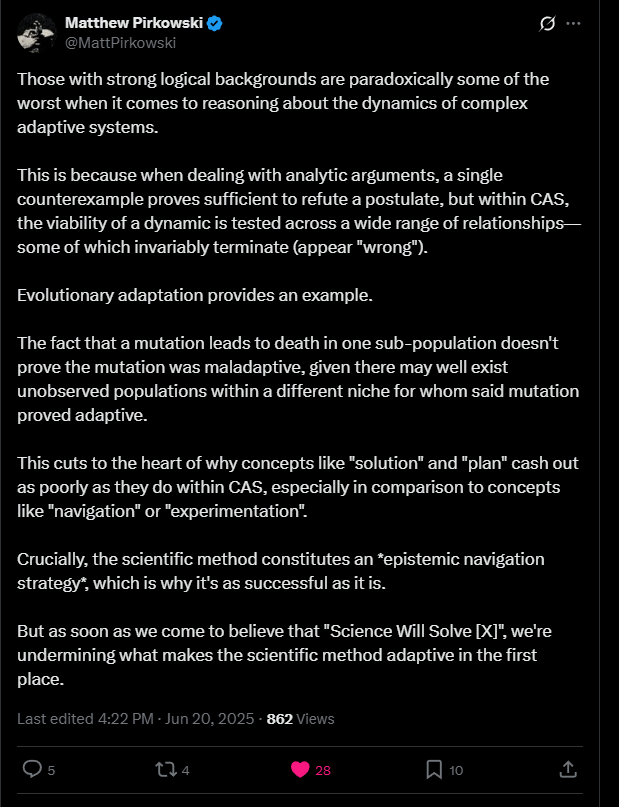Evolutionary Rationalism
Truth as Navigation, Not Destination
Those trained rigorously in formal logic often struggle most when faced with Complex Adaptive Systems (CAS). Matthew Pirkowski captures this paradox succinctly: logic's rigor can become its greatest weakness precisely because CAS resist deductive certainty.
In traditional analytical philosophy and formal sciences, a single counterexample is enough to invalidate a theory or proposition. This rigorous falsification is immensely powerful—within its domain. Yet, when applied blindly to CAS, this approach proves overly brittle. CAS, by their very nature, exist across multiple niches, environments, and interactions. A strategy or mutation that leads to failure or even extinction in one context can thrive spectacularly elsewhere.
This isn't merely theoretical; evolution demonstrates it repeatedly. A mutation causing disaster in one sub-population can become an adaptive breakthrough in another, different niche. Logical absolutes—"solution," "plan," or "proof"—hold little meaning here. Instead, the relevant concepts are navigation, experimentation, and adaptation.
Evolutionary Rationalism precisely embraces this shift in epistemology. Rather than seeing rationality as a fixed logic engine providing eternal truths, it views rationality itself as an evolutionary strategy—adaptively navigating through uncertainty, constantly updating based on feedback, and never becoming attached to rigid certainties.
Science, therefore, succeeds because it is fundamentally evolutionary, not because it provides final answers. It thrives through continuous variation, rigorous testing, and adaptation. Certainty, in contrast, undermines this adaptive strength. Believing that "Science Will Solve [X]" is akin to adopting religious dogma; it halts the exploration and flexibility needed in CAS.
Evolutionary Rationalism does not reject logic—it situates logic within a broader adaptive framework. Logic serves exploration, guiding navigation rather than dictating final destinations. Truth, in this context, is what survives the evolutionary process of continuous experimentation.
Thus, rationality becomes an iterative search algorithm, continuously learning, revising, and navigating—not toward fixed answers, but toward ever-better adaptations.
In short, truth isn't a destination. It's a path, navigated by adaptive rationality.



